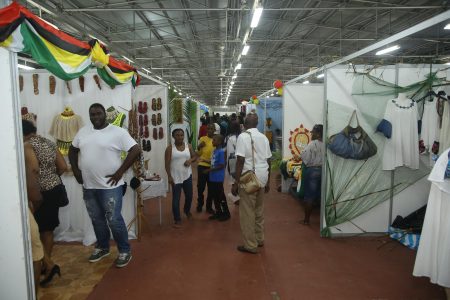Just over a month after Minister of State Joseph Harmon had declared that the APNU+AFC administration had set aside the 165 MV Amalia Falls Hydropower Project, the private sector appears to have not yet written off the controversial power supply option as a vehicle for accelerating the growth of the country’s manufacturing sector.
On Friday, Guyana Manufacturing and Services Association (GMSA) President Shyam Nokta declared at the opening of the public/private sector-sponsored Uncapped agro processing product promotion and marketing event at the Sophia Exhibition Centre that when all of the options for ending the electricity woes plaguing the sector are taken account of, hydropower should remain an option. ”Considering the options for renewable energy, hydropower has emerged as the most feasible and at-scale intervention. However, the most advanced hydropower option, Amaila Falls, continues to be held up in uncertainty,” Nokta declared.”
Harmon had said in an interview with Stabroek News on October 1 that cost considerations had compelled the Granger administration to set aside the Amaila Falls project and instead pursue an energy mix that included natural gas.

In his address at the opening of the Uncapped forum, Nokta himself declared that “as a country we need to embrace an energy mix” though he insisted that it was “critical that we move forward while redoubling efforts to fix the troubled transmission and distribution system.”
The October 27-29 event, billed as an opportunity to seek to aggressively promote the country’s modest and deprived agro-processing sector failed to attract the customary throngs that usually pour in to the Exhibition Site for the Annual GuyExo, though both Nokta and Event Manager and GMSA Vice Chairman Ramsay Ali told Stabroek Business that both the Association and the Ministry of Business had agreed to stage other similar one-day events across the country next year.
In an address that focused much attention on constraints to the growth of the agro processing sector in Guyana, Nokta said that while access to finance was considered to be a major problem this need not be the case on account of the “high level of liquidity in the banking system” which he said could be channeled to agriculture and agro-processing once the right policies are in place. “The work of IPED (Institute of Private Enterprise Development), supporting many agro-processors across Guyana has shown what is possible.”
And according to Nokta while it was expected that the Small and Micro Enterprise Development Fund Partnership – would have been supporting innovation and green initiatives including agro-processing by offering concessionary financing, capacity development and mentoring for small agro-producers and processors, this mechanism however, has not been “as effective as it should” be.
Citing “transport and technology” as a third major challenge facing the sector, Nokta posited that given the high transport cost associated with moving produce to markets it was desirable that “some level of primary processing at source” be devised in order to reduce the cost of moving raw materials. He proposed some measure of deployment of technology to agro-processors in hinterland areas
In his address, Nokta alluded to an earlier recommendation shared with this newspaper regarding the creation of “a centralized agro-processing facility” which he said “will make a big difference” and which he suggested “could be built modularly and through a public/private partnership………..Just imagine the difference it would make if the farmers from Black Bush Polder or Canal Polder know there is a place where they can take their produce and receive a fair price. This will certainly help to strengthen the economic position of farmers and encourage stable supply,” Nokta said.
In his address, the GMSA President also called for “creating an enabling environment for investments in agriculture and agro processing including a menu of measures aimed at reducing tax burdens on manufacturers and agro-processors; continuing to work to lower or remove non-tariff barriers; improving and establishing critical infrastructure such as farm to market access roads and cold storage facilities at ports of entry; improving the regulatory framework and support facilities to ensure agro-products can meet national and international standards” by establishing a national testing laboratory and reference facilities as well as creating technical support for ISO and other certification, supporting research and development and encouraging a value-chain approach. He said that already existing evidence that large and medium scale operations are working with small operators needs to be supported.




